The European Space Agency (ESA) selected Spain-based multinational aerospace company GMV as a supplier of an RF constellation simulator for Galileo second-generation satellites, which have just entered production. The main objectives of Galileo Second Generation (G2G) are the phasing in of new services, improvement of existing services and increase of security. Work on the simulator will be performed at the company’s facility in Portugal.
GMV will lead a consortium that will supply a simulator covering both the 1st and 2nd Galileo generations, to support G2G engineering and experimentation activities in the Open Service and the Public Regulated Service domain.
GMV teams in Portugal and Spain together with partners Orolia (France) and Tecnobit (Spain) are developing a constellation simulator to simulate the progressive deployment of the G2G with its new signals, as a support to G2G infrastructure and for the testing of experimental user receivers.
In addition to the simulation of the constellation and radio frequency signals emitted by the satellites, the RFCS will cover many user characteristics such as dynamic behavior, signal impairments such as multipath, interference and signal distortion as well as also hybrid solutions such as GNSS + inertial.
The RFCS is designed to guarantee flexibility, configurability, modularity, scalability as well as segregation of need-to-know information. For this purpose, the RFCS will consist of commercial off-the-shelf (COTS) products and follows a software-designed radio approach.
GMV now operates subsidiaries in Spain, USA, Germany, France, Poland, Portugal, Romania, the UK, the Netherlands, Malaysia and Colombia.






